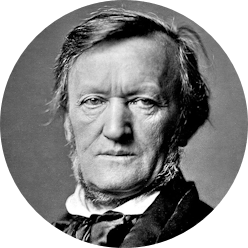
Richard Wagner
May 22, 1813 - Leipzig (Germany) — February 13, 1883 - Venice (Italy)
About
Richard Wagner, the master of Romantic opera
Richard Wagner has aroused both the most unyielding passions and the fiercest hatred alike. Quickly drawn to the world of theatre, in his childhood Wagner staged the mythological dramas he wrote and had his mother, brothers and sisters play their parts. He managed to accomplish great projects from his self-taught education. A choir master in 1833, a conductor in 1834, he composed his first operas in the great Germanic singspiel tradition.
Richard Wagner and the Bayreuth project
After having composed Rienzi, Richard Wagner left town under threat from his creditors. Years of exile began. His creative genius received uneasy welcome in Paris and the composer took refuge in Switzerland where he wrote some theoretical essays. The passionate love affairs and composition of Tristan and Isolde between 1852 and 1857 were years of great productivity. In 1864, Wagner received the unconditional support of the Bavarian king, Ludwig II whose excessive Romanticism entirely suited the composer’s genius. Having finally gained financial support, Wagner abused the king’s trust and built himself a temple in Bayreuth solely for the performances of his own music. The drama of Parsifal was conceived for this location.
The Wagnerian total art
If Richard Wagner dreamed of a total art, he succeeded via opera in unifying poetry, drama, music, theatre and visual arts. He also forged a totally new harmonic and instrumental language whose expressive intensity remains completely coherent to the present day. Imbued with magical mythology, Wagner discovered unique vocal phrasing, a mysterious atmosphere and powerful ideas, which would seem unsurpassable for the generations to follow.

